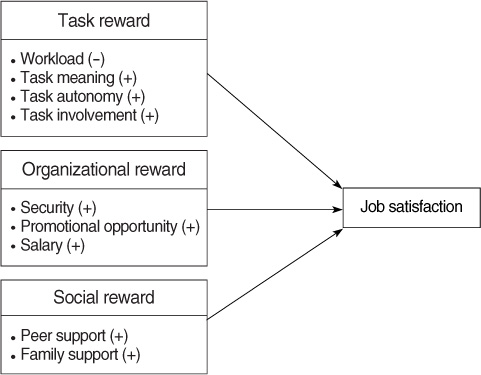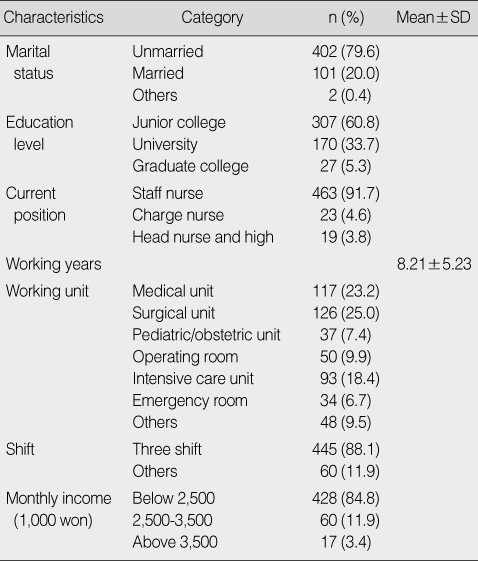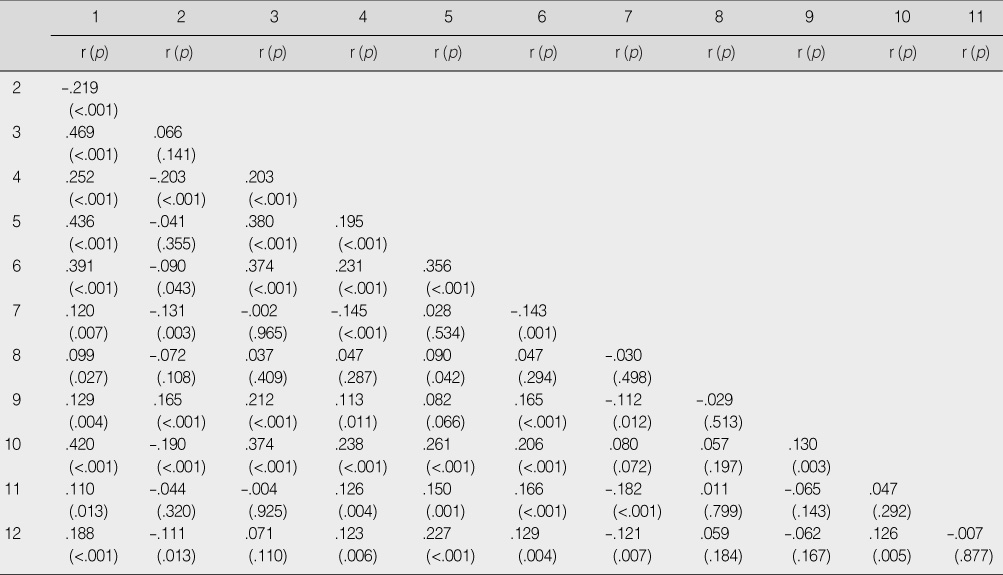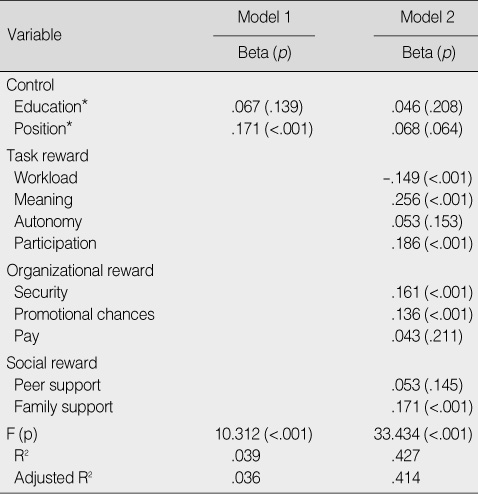Articles
- Page Path
- HOME > J Korean Acad Nurs > Volume 39(3); 2009 > Article
-
Original Article
- The Determinants of Job Satisfaction of Nurses: Focused on Work Rewards
- Young-Hee Yom, Sung-Bok Kwon, Yoon-Young Lee, Eun-Kyung Kwon, Jong-Wook Ko
-
Journal of Korean Academy of Nursing 2009;39(3):329-337.
DOI: https://doi.org/10.4040/jkan.2009.39.3.329
Published online: June 29, 2009
1Professor, Department of Nursing, Chung-Ang University, Seoul, Korea.
2Assistant Professor, Department of Nursing, Dong-Shin University, Naju, Korea.
3Clinical Nurse Specialist, Asan Medical Center, Seoul, Korea.
4Head Nurse, Inha University Hospital, Incheon, Korea.
5Associate Professor, Department of Urban Administration, Anyang University, Anyang, Korea.
- Address reprint requests to: Yom, Young-Hee. Department of Nursing, Chung-Ang University, 221 Heukseok-dong, Dongjak-gu, Seoul 156-756, Korea. Tel: 82-2-820-5700, Fax: 82-2-824-7961, yhyom@cau.ac.kr
Copyright © 2009 Korean Society of Nursing Science
Figure & Data
REFERENCES
Citations

- Influence of Work Environment, Missed Nursing Care, and Non-Nursing Tasks of Hospital Nurses on Job Stress
Ji Yeong Park, Kyoung Ja Kim
Journal of Korean Academy of Nursing Administration.2024; 30(3): 246. CrossRef - Development of a Reward Scale for Hospital Nurses
Sun Hee Kim, Eun-Young Kim
Journal of Korean Academy of Nursing.2023; 53(5): 525. CrossRef - The Effects of Communication Ability, Job Satisfaction, and Organizational Commitment on Nursing Performance of Intensive Care Unit Nurses
Nu Ri Kim, Sung Eun Kim, So Eun Jang
Journal of Korean Critical Care Nursing.2022; 15(1): 58. CrossRef - Influence of Job Stress, Sleep Quality and Fatigue on Work Engagement in Shift Nurses
Ji Yeon Shim, Nam Sook Seo, Mi Ae Kim, Jeung Suk Park
STRESS.2019; 27(4): 344. CrossRef - The Impacts of Work Environment on the Job Satisfaction among the
Landscape Architecture Workers in South Korea
Do-Gyun Kim
Journal of the Korean Institute of Landscape Architecture.2018; 46(1): 106. CrossRef - A Path Analysis of Variables Influencing customer orientation of Hospital Nurses
Eun-Su Do, Young-Sook Seo
Journal of Digital Convergence.2016; 14(1): 275. CrossRef - Effects of Work Intensity and Physical Discomfort on Job Satisfaction in Clinical Nurses
Hyojin Kim, Soonjoo Park
Journal of Korean Academy of Nursing Administration.2016; 22(4): 362. CrossRef - Factors Affecting Job Satisfaction of Immigrant Korean Nurses
Ji-Young An, Sunkyung Cha, Hyunjung Moon, Jeanne S. Ruggiero, Haeran Jang
Journal of Transcultural Nursing.2016; 27(2): 126. CrossRef - The Effects of Rehabilitation Hospital Nurses' Professional Autonomy and Self-Efficacy on Professional Self-Concept
Sang Hee Kim, Nam Hee Kim
Journal of the Korea Academia-Industrial cooperation Society.2016; 17(1): 165. CrossRef - The Moderating Effect of Empowerment in Relationship between Self-leadership and Job Satisfaction for Nurses Working in Long-term Care Hospitals
Kyoungsuk Kim, Heeok Park
Journal of Korean Gerontological Nursing.2016; 18(1): 32. CrossRef - Effects of Job Characteristics, Organizational Culture on Job Satisfaction and Turnover Intention in Public Institution Nurses
Young Joo Lee, So Hee Kim, Taewha Lee
Journal of Korean Academy of Nursing Administration.2015; 21(4): 354. CrossRef - Moderating and Mediating Effects of Social Support in the Relationship between Work-family Conflict, Job Satisfaction and Turnover Intention among Married Women Nurses
Yuna Kim, Insil Jang
Journal of Korean Academy of Nursing Administration.2014; 20(5): 525. CrossRef - Factors Influencing Job Involvement among Korean Female Office Workers by Marital Status
Hae Ok Jeon, Min Hee Park
Journal of the Korea Academia-Industrial cooperation Society.2013; 14(10): 4953. CrossRef - Factors Influencing Happiness Index of Hospital Nurses
Moon Hee Nam, Young Chae Kwon
Journal of Korean Academy of Nursing Administration.2013; 19(3): 329. CrossRef - Job Satisfaction among Korean Nurses: A Literature Review
Gyeong Sun Jeong, Myun Sook Jung
Journal of muscle and joint health.2013; 20(3): 235. CrossRef - Impact of Nurses' Job Satisfaction and Organizational Commitment on Patient Safety Management Activities in Tertiary Hospitals
Hyun Hee Gong, Youn-Jung Son
Journal of Korean Academy of Fundamentals of Nursing.2012; 19(4): 453. CrossRef - The Effects of DISC Behavior Styles of Office Workers on Job Satisfaction, Organizational Commitment and Job Performance
Yun-Young Kim, Young-Hwa Baek, Ki-Hyun Park, Jong-Hyang Yoo, Eun-Su Jang
Korean Journal of Occupational Health Nursing.2012; 21(2): 98. CrossRef - Relationships between Compassion Fatigue, Burnout, and Turnover Intention in Korean Hospital Nurses
Kiwol Sung, Youngsook Seo, Jee Hee Kim
Journal of Korean Academy of Nursing.2012; 42(7): 1087. CrossRef

Figure 1
General Characteristics (N=505)
Correlations among Variables
1=job satisfaction; 2=workload; 3=meaning; 4=autonomy; 5=participation; 6=security; 7=promotional opportunity; 8=salary; 9=peer support; 10=family support; 11=education; 12=position.
Results of Hierarchical Regression
*Dummy variables: education (1=higher than junior college graduate; 0=junior college graduate), position (1=head nurse or higher position; 0=lower than head nurse).
1=job satisfaction; 2=workload; 3=meaning; 4=autonomy; 5=participation; 6=security; 7=promotional opportunity; 8=salary; 9=peer support; 10=family support; 11=education; 12=position.
*Dummy variables: education (1=higher than junior college graduate; 0=junior college graduate), position (1=head nurse or higher position; 0=lower than head nurse).
 KSNS
KSNS
 E-SUBMISSION
E-SUBMISSION




 Cite
Cite

